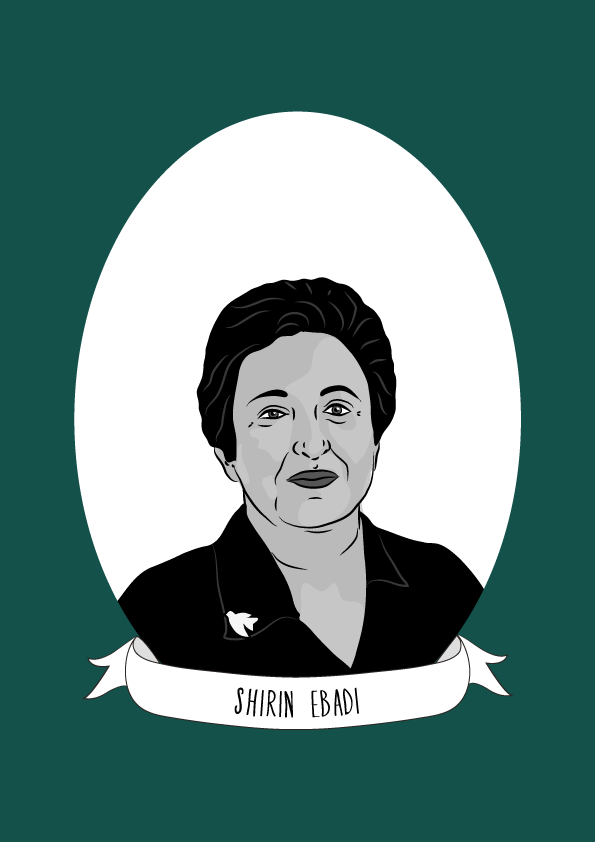Shirin Ebadi is an Iranian lawyer and human-rights activist who founded the Defenders of Human Rights Center in Iran. She was the first female judge in Iran, and the first Iranian and the first Muslim woman to win the Nobel Peace Prize.
Ebadi was born in 1947 in Hamadan, Iran. A year later, her family moved to Tehran where she attended school. She then continued her education at Tehran University after passing the entrance exams for the Faculty of Law. After her graduation, she sat the exams for the Department of Justice and in 1969 she became the first woman in the history of Iranian justice to have served as a judge. Ebadi continued her education, studying for a doctorate in private law at the University of Tehran, which she achieved in 1971. Four years later, she became the first woman president of the Tehran city court.
In 1979, following the Iranian revolution, and the establishment of the Islamic republic, conservative religious leader Ruhollah Musawi Khomeini decreed that women could not serve as judges. Ebadi was forced to resign from her position and became a clerk of the court. She and her fellow female former judges protested, and were made “experts” in the Justice Department instead. Ebadi petitioned for early retirement, and attempted to open a private law practice, but was denied her lawyer’s license until 1992. While waiting for her application to be approved, she taught human rights courses at Tehran University. She also wrote several books and various articles.
As a lawyer, Ebadi took on civil rights cases for those who had also been persecuted by the Iranian government, focusing on cases which involved women and children. She represented the mother of Arin Golshani, a girl who was tortured and killed under her father’s custody, the mother of murdered photojournalist Zahra Kazemi and the families of the serial murders victims (the family of Dariush and Parvaneh Foruhar) and Ezzat Ebrahiminejad who was murdered during an attack on Tehran University. Ebadi also distributed evidence which showed that government officials were responsible for the murder of the students, which led to her being jailed for three weeks in 2000 for “disturbing public opinion,” and banned from practising law for five years. Her sentence was later suspended.
In 2001, Ebadi cofounded the Centre for Defenders of Human Rights (DHRC) with four defence lawyers to defend the rights of women, political prisoners and minorities in Iran. The centre is a member of the International Federation for Human Rights and received the 2003 Human Rights Award of the French National Commission of Human Rights. A year later, a law she had proposed against the physical abuse of children to the Islamic Consultative Assembly (Majlis) was passed. In 2003, Ebadi was recognised for “her efforts for democracy and human rights, especially for the rights of women and children.” Since receiving the award, she had lectured, taught and received awards in many other countries. In 2006, Ebadi along with Wangari Maathai, Rigoberta Menchú, Jody Williams, Mairead Maguire, and Betty Williams founded the Nobel Women’s Initiative to support women’s groups around the world in campaigning for justice, peace and equality. She has established a number of non-governmental organisations in Iran, including the Million Signatures Campaign, which campaigns for an end to legal discrimination against women in Iranian Law and the Association for Support of Children’s Rights in Iran.
The lives of Ebadi and her family were constantly threatened, and in 2008, the DHRC was closed by Islamic authorities, and her computer and files seized. A year later, Ebadi fled to the UK and is currently living there in exile. She has published over 70 articles, and a number of books on civil rights including: Iran Awakening: One Woman’s Journey to Reclaim Her Life and Country (2007); Refugee Rights in Iran (2008), The Golden Cage (2011) and Until We Are Free: My Fight for Human Rights in Iran (2016).
